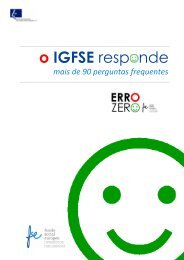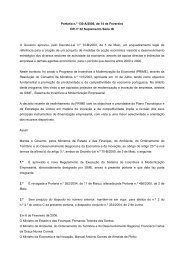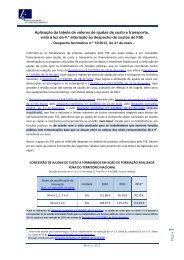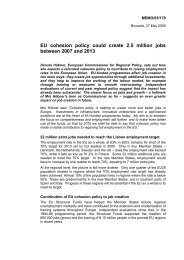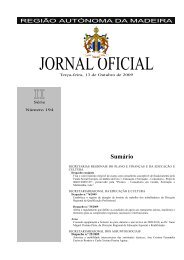Industrial Relations in Europe 2012 - European Commission - Europa
Industrial Relations in Europe 2012 - European Commission - Europa
Industrial Relations in Europe 2012 - European Commission - Europa
Create successful ePaper yourself
Turn your PDF publications into a flip-book with our unique Google optimized e-Paper software.
<strong>Commission</strong> must consult the social partners twice on each legislative proposal <strong>in</strong> the fields of<br />
social policy: first on the possible direction of EU action, and <strong>in</strong> a second stage on the content of the<br />
<strong>Commission</strong>'s proposal. In respond to either a first- or second-stage consultation, the social partners<br />
have the right to <strong>in</strong>form the <strong>Commission</strong> that they wish to start formal negotiations on the given<br />
subject. If they decide to do that, the social partners have n<strong>in</strong>e months to reach agreement, dur<strong>in</strong>g<br />
which the <strong>Commission</strong> suspends its work on the proposal. The n<strong>in</strong>e month period can be extended<br />
if needed and agreed with the <strong>Commission</strong>.<br />
The social partners can negotiate b<strong>in</strong>d<strong>in</strong>g agreements at EU level either <strong>in</strong> response to a<br />
<strong>Commission</strong> consultation or on their own <strong>in</strong>itiative. Accord<strong>in</strong>g to Article 155 TFEU, agreements<br />
reached by the social partners can be implemented <strong>in</strong> two ways. First, agreements can be adopted<br />
"<strong>in</strong> accordance with procedures and practices specific to management and labour and the Member<br />
States", which means that the social partners are responsible for implement<strong>in</strong>g agreements at<br />
national level and <strong>in</strong> a way stipulated by national legislation or practice (autonomous agreements).<br />
This procedure can be used for autonomous agreements between the social partners on any subject.<br />
Second, on matters fall<strong>in</strong>g under Article 153 TFEU, the social partners can jo<strong>in</strong>tly request the<br />
<strong>Commission</strong> to submit their agreement to the Council which can adopt it by decision, mak<strong>in</strong>g it<br />
legally b<strong>in</strong>d<strong>in</strong>g <strong>in</strong> the EU. The <strong>Europe</strong>an Parliament will be <strong>in</strong>formed if this legislative procedure is<br />
used. If the social partners' agreement is adopted as a legislative act, the Member States are obliged<br />
to implement its provisions as <strong>in</strong> the case of other Directives and the <strong>Commission</strong> monitors the<br />
transposition process to the national legal systems. Article 153 of the Treaty also allows the<br />
Member States to entrust national social partners with the implementation of a Directive's<br />
provisions.<br />
In addition to <strong>Europe</strong>an social dialogue at cross-<strong>in</strong>dustry and sectoral level, dialogue between the<br />
representatives of management and labour also takes place at the level of transnational companies,<br />
<strong>in</strong>clud<strong>in</strong>g through <strong>Europe</strong>an works councils. Section 8.2.5 <strong>in</strong> chapter 8 provides basic <strong>in</strong>formation<br />
on these forms of social dialogue, while further details on transnational company agreements,<br />
<strong>in</strong>clud<strong>in</strong>g the <strong>2012</strong> <strong>Commission</strong> staff work<strong>in</strong>g document entitled "Transnational company<br />
agreements: realis<strong>in</strong>g the potential of social dialogue" are available onl<strong>in</strong>e<br />
(http://ec.europa.eu/social/ma<strong>in</strong>.jsp?catId=707&langId=en&<strong>in</strong>tPageId=214).<br />
The cont<strong>in</strong>ued attractiveness of <strong>Europe</strong>an social dialogue for management and labour can be seen <strong>in</strong><br />
the cont<strong>in</strong>u<strong>in</strong>g <strong>in</strong>terest <strong>in</strong> creat<strong>in</strong>g new sectoral social dialogue committees. One sector, the food<br />
and dr<strong>in</strong>k <strong>in</strong>dustry, launched its committee – the 41 st <strong>Europe</strong>an sectoral social dialogue committee –<br />
<strong>in</strong> early <strong>2012</strong>. The social partners <strong>in</strong> the sports and active leisure sector are advanc<strong>in</strong>g towards the<br />
creation of a social dialogue committee, while organisations <strong>in</strong> the graphical and ports sectors are<br />
also work<strong>in</strong>g on sett<strong>in</strong>g up social dialogue committees. As a result the total number of social<br />
dialogue committees is expected to reach 44 <strong>in</strong> the near future (box 7.2).<br />
Box 7.2 New sectoral social dialogue committees<br />
In <strong>2012</strong>, a new sectoral social dialogue committee was established for the food and dr<strong>in</strong>k <strong>in</strong>dustry,<br />
br<strong>in</strong>g<strong>in</strong>g the total to 41 sectoral social dialogue committees. The food and dr<strong>in</strong>ks <strong>in</strong>dustry had been<br />
the last <strong>in</strong>dustrial sector that was not covered by a <strong>Europe</strong>an social dialogue committee. The first<br />
260



